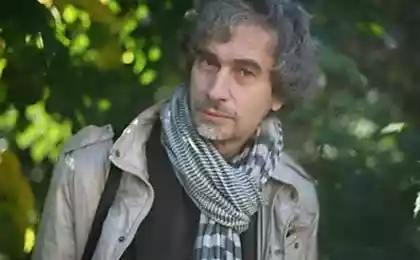468
Interesting and easy learning of the child
Here we learn a little bit about how to make the process of learning more interesting and easier for all parties to the action. What is important to consider when learning what features of the brain development of the child?
It is no secret that any parent, learn of him the child in a regular school, home schooling or by answerstv, wish the child was inquisitive, developed according to the plan of nature, acquired new knowledge and skills, successfully solved the problem of life.

© Monika Koclajda
And I feel that it all happened as easy as possible for the child and for the whole family, worry for the future of his child. On the burning questions of parents of children in alternative education is the responsibility of the neuropsychologist Hope Monastery.
1. Without school and system (take unschooling) the child learns self-organization, setting goals, achieving goals, discipline?
The child learns self-organisation in process of maturing of the brain, specifically the frontal lobes, responsible for functions of arbitrary. They are developing longer than any other areas and reach maturity much after school. School, as such, does not teach self-organization. It gives a certain set of knowledge and requires that you have completed. Further depends on the particular teacher, a particular family. You can gradually delegate the child certain responsibilities, realizing their responsibility and leading role in this process.
2. How long can I keep focus the child's attention on the task at hand to achieve results? My daughter is 8 years old. She starts to do something, and then throws, not brought to an end. If is age, at what age she will be able to do harder? If this does not happen as quickly as we would like to mom, how does a parent cope with their inner feelings?
I saw here two separate questions – how to change the situation and how to accept it. I can say that in 8 years not every child is able long to keep attention on something, and that's fine. This in particular depends on the individual characteristics of neurodynamics (performance). Better to split it into small pieces, and in between playing games that help improve circulation. As for how to accept your feelings – first you need to sort through, where the real situation where your expectations and projections. On is a lot of work on yourself.
3. My child's lack of concentration. We're having difficulty in school. This year we went to family education. How do we optimally organize the learning process?
First. An elephant should eat the pieces. Don't let the big tasks at once. Help the child to begin to see what parts they consist of. Then the child will not waste energy on resistance is terrible heavy, at first sight of the child task.
Second. We estimate that at this stage of development really the child is not “expected age”, namely by virtue of him.
Third. Complicate the task gradually. Start with what the child is easy, not to scare. To give a feel for the success and excitement. It is possible initially to take a portion of that is given to difficult, gradually complicating the task.
Fourth. The sooner a child is faced with a sense of failure, however categorically it will take it up to drop out from school, loss of interest or approval, “I am a fool.” Over time the child develops the ability to mix senses and he begins to treat failures differently.
4. What are the techniques to increase concentration?
Techniques to increase attention, of course. For example, a very good collection of games for development of attention of the series “Tips for the neuropsychologist of the publishing house EKSMO. It is important to consider what is the attention deficit. It depends on which areas of the brain are not Mature enough. Many features of the focus are adjusted over time. Not from each child to expect that he will be supervnimatelnym. Especially if deficiency is associated with features of blood circulation or other physiological causes. Can be approached from different sides to this issue. Here to the aid can come in the course of neuropsychological correction, osteopathy, physical therapy, pool, breathing exercises, gentle.
5. Recently read Tatiana Chernigovskaya (neurolinguist and experimental psychologist): latest studies show the brain is not a rigid separation of functions on the right and left hemisphere. Sometimes, the right hemisphere takes over the functions of the left and Vice versa. In connection with this question: how valid are the projects pravoberezhnomu teaching children? How effective are they?
Yes, indeed, the hemispheres differ not so much functionality, as a way of processing information. They are very plastic and, depending on the situation, certain features may take on atypical areas. However, some predetermination exists, of course. So, the speech area and right-handers statistically are more often located in the left hemisphere than in the right. But as for right brain training – then I, unfortunately, do not tell, because not too familiar with the methods to evaluate its effectiveness.
6. We are told that socialization occurs in society, mainly at school. But is it? Does the development of social skills (sociability, ability to create and maintain social bonds) upon the maturity of the brain?
You are absolutely right, the ability to socialize depends on the degree of maturity of the brain. Otherwise, the orphanage children would be the most socialized people. But, unfortunately, statistics say otherwise. What do we mean by socialization? Integration into society, taking into account the rights and freedoms of others without losing yourself or “bowing” under it? It is important that in addition to the external shape (to do or not to do something) was crystallized and the content, the inner meaning of a particular style of interaction with society. This is possible provided a certain degree of maturity. Of course, the development of any ability need to be trained in an empty dark room we don't socialities. But do this for the crowd of peers under the control of one tired adult? Family, family friends, people on the ground, in circles, in the store – is also a society.
7. What problems contact a neuropsychologist? How to distinguish them from problems that need to consult some other specialist? What parents pay attention to?
Classic about the treatment of the neuropsychologist are: underachievement, inattention, hyperactivity, sluggishness, lack of interest in learning, not compliance development age norms. Each of these problems may be based not so much on the immaturity of the brain, but rather on the problems of parent-child and other relationships. More precisely, it is usually both. My experience is that it is more effective to focus on the work on the relationship then even the weak zone tightened when the brain is not busy “working on security”. In the presence of the above problems you can contact the neuropsychologist and he will appreciate how much this is due to immaturity of the brain.
If the problem is initially emotional, fears, for example, you should go to therapy. If the problem is associated with cognitive or educational motivation can be useful to the neuropsychologist. The child – being curious, and unwillingness to learn is rarely out of nowhere. Most often it is associated with difficulties, explicit or implicit, or with the fact that the brain of a child “not before.”
8. My child is studying in 4 class. He has bad attention, jumps in the conversation with phrases a phrase does not finish them. Bad wrote: a lot of mistakes. How can I help him? Please advise, benefits for children with problems in the Russian language.
In the first place – to create an atmosphere of safety, without excessive evaluation. Probably the most difficult balance in the case of home schooling. Many children make mistakes because of haste, anxiety, they don't have enough resource at the same time focused on work and struggle with anxiety, and resistance what is the game forced to do now.
The second – quietly, slowly you need to divide a large task into parts – first it makes a parent, then together with the child and gradually the child begins to do it himself. More detail can be answered just by looking at the individual child with its features.
Is a great benefit Soboleva, “Write without errors. Russian language with the neuropsychologist”. There are exercises to work with different problems when learning Russian language. They are organized from the point of view of neuropsychological logic.
9. The question of motivation to study. Heard the opinion that “obedient”children learn well only in primary school, and yet sincerely believe that only because of their obedience their love. In the senior classes children are slipping badly, because of intrinsic motivation and interest in learning had never been. In this case, from the beginning to interest the child in study or explain its necessity?
Indeed, children in the first years of study more focused on affection, for approval of an adult. In older age personal educational interests are manifested more clearly. There is nothing to worry. It is just so. Let the child reaches for those who are dear to him, and absorbs his values! It is important not to interfere, not to give the rating of the child's abilities (both negative and positive) too much weight. The curiosity inherent in us by nature, in particular, and as a tool of cognition of the surrounding world. If your child has a resistance to learning – need to look for the cause, not “explain the need”. To understand this need he truly will come closer to the Institute.published
Author: Hope Monastery
P. S. And remember, just changing your mind — together we change the world! ©
Join us in Facebook , Vkontakte, Odnoklassniki
Source: alpha-parenting.ru
It is no secret that any parent, learn of him the child in a regular school, home schooling or by answerstv, wish the child was inquisitive, developed according to the plan of nature, acquired new knowledge and skills, successfully solved the problem of life.

© Monika Koclajda
And I feel that it all happened as easy as possible for the child and for the whole family, worry for the future of his child. On the burning questions of parents of children in alternative education is the responsibility of the neuropsychologist Hope Monastery.
1. Without school and system (take unschooling) the child learns self-organization, setting goals, achieving goals, discipline?
The child learns self-organisation in process of maturing of the brain, specifically the frontal lobes, responsible for functions of arbitrary. They are developing longer than any other areas and reach maturity much after school. School, as such, does not teach self-organization. It gives a certain set of knowledge and requires that you have completed. Further depends on the particular teacher, a particular family. You can gradually delegate the child certain responsibilities, realizing their responsibility and leading role in this process.
2. How long can I keep focus the child's attention on the task at hand to achieve results? My daughter is 8 years old. She starts to do something, and then throws, not brought to an end. If is age, at what age she will be able to do harder? If this does not happen as quickly as we would like to mom, how does a parent cope with their inner feelings?
I saw here two separate questions – how to change the situation and how to accept it. I can say that in 8 years not every child is able long to keep attention on something, and that's fine. This in particular depends on the individual characteristics of neurodynamics (performance). Better to split it into small pieces, and in between playing games that help improve circulation. As for how to accept your feelings – first you need to sort through, where the real situation where your expectations and projections. On is a lot of work on yourself.
3. My child's lack of concentration. We're having difficulty in school. This year we went to family education. How do we optimally organize the learning process?
First. An elephant should eat the pieces. Don't let the big tasks at once. Help the child to begin to see what parts they consist of. Then the child will not waste energy on resistance is terrible heavy, at first sight of the child task.
Second. We estimate that at this stage of development really the child is not “expected age”, namely by virtue of him.
Third. Complicate the task gradually. Start with what the child is easy, not to scare. To give a feel for the success and excitement. It is possible initially to take a portion of that is given to difficult, gradually complicating the task.
Fourth. The sooner a child is faced with a sense of failure, however categorically it will take it up to drop out from school, loss of interest or approval, “I am a fool.” Over time the child develops the ability to mix senses and he begins to treat failures differently.
4. What are the techniques to increase concentration?
Techniques to increase attention, of course. For example, a very good collection of games for development of attention of the series “Tips for the neuropsychologist of the publishing house EKSMO. It is important to consider what is the attention deficit. It depends on which areas of the brain are not Mature enough. Many features of the focus are adjusted over time. Not from each child to expect that he will be supervnimatelnym. Especially if deficiency is associated with features of blood circulation or other physiological causes. Can be approached from different sides to this issue. Here to the aid can come in the course of neuropsychological correction, osteopathy, physical therapy, pool, breathing exercises, gentle.
5. Recently read Tatiana Chernigovskaya (neurolinguist and experimental psychologist): latest studies show the brain is not a rigid separation of functions on the right and left hemisphere. Sometimes, the right hemisphere takes over the functions of the left and Vice versa. In connection with this question: how valid are the projects pravoberezhnomu teaching children? How effective are they?
Yes, indeed, the hemispheres differ not so much functionality, as a way of processing information. They are very plastic and, depending on the situation, certain features may take on atypical areas. However, some predetermination exists, of course. So, the speech area and right-handers statistically are more often located in the left hemisphere than in the right. But as for right brain training – then I, unfortunately, do not tell, because not too familiar with the methods to evaluate its effectiveness.
6. We are told that socialization occurs in society, mainly at school. But is it? Does the development of social skills (sociability, ability to create and maintain social bonds) upon the maturity of the brain?
You are absolutely right, the ability to socialize depends on the degree of maturity of the brain. Otherwise, the orphanage children would be the most socialized people. But, unfortunately, statistics say otherwise. What do we mean by socialization? Integration into society, taking into account the rights and freedoms of others without losing yourself or “bowing” under it? It is important that in addition to the external shape (to do or not to do something) was crystallized and the content, the inner meaning of a particular style of interaction with society. This is possible provided a certain degree of maturity. Of course, the development of any ability need to be trained in an empty dark room we don't socialities. But do this for the crowd of peers under the control of one tired adult? Family, family friends, people on the ground, in circles, in the store – is also a society.
7. What problems contact a neuropsychologist? How to distinguish them from problems that need to consult some other specialist? What parents pay attention to?
Classic about the treatment of the neuropsychologist are: underachievement, inattention, hyperactivity, sluggishness, lack of interest in learning, not compliance development age norms. Each of these problems may be based not so much on the immaturity of the brain, but rather on the problems of parent-child and other relationships. More precisely, it is usually both. My experience is that it is more effective to focus on the work on the relationship then even the weak zone tightened when the brain is not busy “working on security”. In the presence of the above problems you can contact the neuropsychologist and he will appreciate how much this is due to immaturity of the brain.
If the problem is initially emotional, fears, for example, you should go to therapy. If the problem is associated with cognitive or educational motivation can be useful to the neuropsychologist. The child – being curious, and unwillingness to learn is rarely out of nowhere. Most often it is associated with difficulties, explicit or implicit, or with the fact that the brain of a child “not before.”
8. My child is studying in 4 class. He has bad attention, jumps in the conversation with phrases a phrase does not finish them. Bad wrote: a lot of mistakes. How can I help him? Please advise, benefits for children with problems in the Russian language.
In the first place – to create an atmosphere of safety, without excessive evaluation. Probably the most difficult balance in the case of home schooling. Many children make mistakes because of haste, anxiety, they don't have enough resource at the same time focused on work and struggle with anxiety, and resistance what is the game forced to do now.
The second – quietly, slowly you need to divide a large task into parts – first it makes a parent, then together with the child and gradually the child begins to do it himself. More detail can be answered just by looking at the individual child with its features.
Is a great benefit Soboleva, “Write without errors. Russian language with the neuropsychologist”. There are exercises to work with different problems when learning Russian language. They are organized from the point of view of neuropsychological logic.
9. The question of motivation to study. Heard the opinion that “obedient”children learn well only in primary school, and yet sincerely believe that only because of their obedience their love. In the senior classes children are slipping badly, because of intrinsic motivation and interest in learning had never been. In this case, from the beginning to interest the child in study or explain its necessity?
Indeed, children in the first years of study more focused on affection, for approval of an adult. In older age personal educational interests are manifested more clearly. There is nothing to worry. It is just so. Let the child reaches for those who are dear to him, and absorbs his values! It is important not to interfere, not to give the rating of the child's abilities (both negative and positive) too much weight. The curiosity inherent in us by nature, in particular, and as a tool of cognition of the surrounding world. If your child has a resistance to learning – need to look for the cause, not “explain the need”. To understand this need he truly will come closer to the Institute.published
Author: Hope Monastery
P. S. And remember, just changing your mind — together we change the world! ©
Join us in Facebook , Vkontakte, Odnoklassniki
Source: alpha-parenting.ru
Tinctures, which you must have in the home medicine Cabinet
An innovative type of nanomotors operating from visible light
























